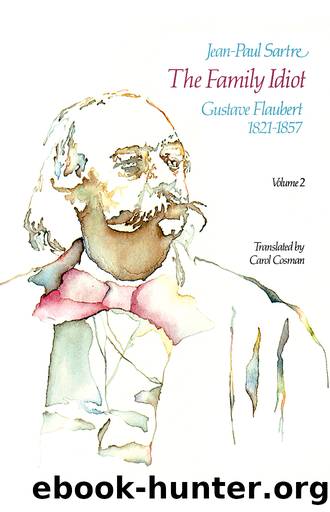The Family Idiot: Gustave Flaubert, Volume 2 by Jean-Paul Sartre

Author:Jean-Paul Sartre
Language: eng
Format: epub
Publisher: The University of Chicago Press
Published: 2021-06-15T00:00:00+00:00
ELEVEN
Scripta Manent
In this case, the conversion seems to be a phase of personalization. It is no longer only a question of internalizing what is suffered or even of assuming it in the unity of stress; in Gustaveâs case it is also a matter of going with the impulse to make a brutal about-face, of gradually guiding it and, after a rotation of 180 degrees, of assuming his situation by surpassing it toward an elsewhere defined and posed by a new and spontaneous option, as if it were the chance of a lifetime.
But first, a cautionary word: for Gustave, literature was born of a thwarted vocation, and it would always bear that mark. I would recall, however, that the original vocation was no gift, in the ordinary sense of the wordâit was neither plenitude nor capacity but a need. As an actor, Gustave was not gifted;1 he acted so as to launch an appeal to being by exploiting the means at hand, that is, his very derealization. But can we say that he himself did not regret being discouraged? Properly guided, couldnât he have gone on to act before the public and known glory in the theater? I answer that the question is meaningless. Gustave is not Kean, and he knows it very well: the son of a respectable family, his first vocation was born to be thwarted. And if he had rebelled? If he had fled the paternal domain? Then he would not have been that Gustave for whom, as we know, all active revolt was forbidden. We can ask only one meaningful question: Having been an actorâin front of his comrades, his family, his peersâwhen he played his favorite rolesâthe Garçon, the Idiot, the good Giant, the Excessive, or Saint Polycarpâwas he any good? Was he convincing? To find out we must examine the testimony of those who saw him. The testimony varies from one witness to another and, for some, from one moment to the next; occasionally he fascinated or disturbed. The Goncourts were stupefied by the Idiotâs carryings-on; his father took fright when he imitated the Journalist of Nevers. Sometimes he won people overâwitness his influence over his schoolmatesâbut chiefly he was irritating. And then he was quite transparent: Jules and Edmond were quick to sense something forced and false in his game that shattered the illusion. Later, neither Laporte nor Lapierre believed in Saint Polycarp or the Giant: they played at being believers out of friendship, to please him. The main thing here is that he is destined to incarnate a single characterâfor all his avatars resemble each otherânot entirely his own character but the persona he wants to appear in the eyes of others, which we will describe in the next chapter. Thus his first vocation seems scarcely more than the simplest and most immediate reaction to his derealization; and I mean that this, as well as his constituted passivity and his pithiatism, would have served him if he had gone into the theater. But
Download
This site does not store any files on its server. We only index and link to content provided by other sites. Please contact the content providers to delete copyright contents if any and email us, we'll remove relevant links or contents immediately.
4 3 2 1: A Novel by Paul Auster(12393)
The handmaid's tale by Margaret Atwood(7767)
Giovanni's Room by James Baldwin(7346)
Asking the Right Questions: A Guide to Critical Thinking by M. Neil Browne & Stuart M. Keeley(5775)
Big Magic: Creative Living Beyond Fear by Elizabeth Gilbert(5774)
Ego Is the Enemy by Ryan Holiday(5450)
The Body: A Guide for Occupants by Bill Bryson(5098)
On Writing A Memoir of the Craft by Stephen King(4944)
Ken Follett - World without end by Ken Follett(4734)
Adulting by Kelly Williams Brown(4574)
Bluets by Maggie Nelson(4559)
Eat That Frog! by Brian Tracy(4541)
Guilty Pleasures by Laurell K Hamilton(4450)
The Poetry of Pablo Neruda by Pablo Neruda(4109)
Alive: The Story of the Andes Survivors by Piers Paul Read(4033)
White Noise - A Novel by Don DeLillo(4012)
Fingerprints of the Gods by Graham Hancock(4004)
The Book of Joy by Dalai Lama(3986)
The Bookshop by Penelope Fitzgerald(3854)
